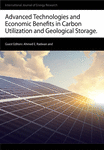CO2 (hereafter carbon) geological storage is a support technology for carbon emission reduction and the latest security system to achieve zero carbon emissions. The sites suitable for geological storage, oil and gas reservoirs, saline aquifers, deep sea geological structures and unsuitable coal seams for mining, etc., are depleted. Geological formations can store carbon emissions, with this capacity being contingent on factors such as rock type, depth, and the fluids contained within the rock. In recent years, carbon geological storage technology has seen rapid development, with significant breakthroughs in geological storage mechanisms, cap rock integrity assessment, environmental risk evaluation, and numerical simulations. However, the practical application of large-scale carbon geological storage technologies has raised numerous scientific and engineering challenges during its development, attracting the attention of researchers, policymakers, operating companies, and the public.
Despite increasing attention and investment in the field of carbon geological storage, there are still several challenges. Firstly, the current maturity of carbon geological storage technology remains low, with few large-scale commercial projects, and high technological costs. Secondly, carbon geological storage requires high geological conditions, necessitating geological assessments in different regions, which limits widespread application on a large scale. Thirdly, existing laws, regulations, and technical standards are still insufficient, resulting in a low level of sustainable development for carbon geological storage projects. Finally, carbon geological storage requires significant financial investment, making economic evaluation particularly important. Also, there are also other issues, such as challenges related to social acceptance and environmental risks.
This Special Issue aims to discuss the research advancements in the technical and economic evaluation of carbon geological storage, spanning multiple disciplines including geology, materials science, chemical engineering, environmental science, and economics. It is hoped that this discussion will contribute to accelerating the transition to a low-carbon economy and mitigating the impacts of climate change. We invite submissions of Articles, Mini-Reviews, Reviews, or Perspectives on diverse topics related to carbon geological storage.
Potential topics include but are not limited to the following:
- Carbon geological storage mechanism
- Carbon geological storage potential and suitability assessment
- CO2-enhanced oil recovery techniques
- Mechanism of CO2 injection to enhance gas recovery and carbon storage
- Characterization and sealing evaluation of faults (fractures) in oil and gas reservoirs
- Safety assessment of carbon geological storage in different formations
- Economic modeling and cost-benefit analysis of carbon geological storage projects
- Regulatory policies for carbon geological storage
- Environmental risk assessment of carbon geological storage
- Technical and economic evaluation of carbon utilization pathways.
- Case studies of carbon geological storage




